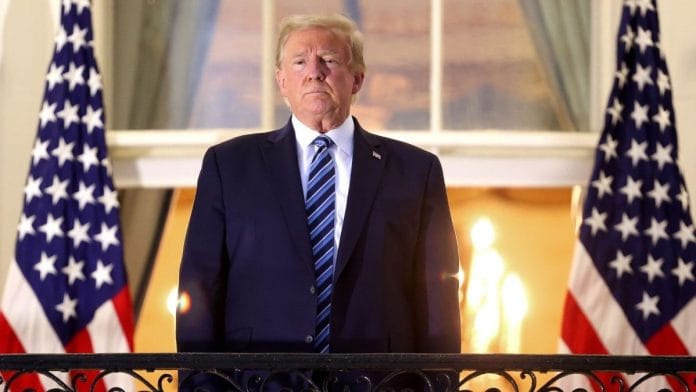Last night, President Donald Trump took a tiny step back from his repeated refusals to say he’ll leave office if he loses the election. Yet he continued to portray a fair election as nearly impossible. The result is to continue to cast doubt on the election result and give himself room to challenge it if he loses the election “unfairly.”
These claims are deeply harmful to our democracy — that much should be obvious. But it’s useful to divide the harm into two parts, to understand how worried we should be and figure out what we should do about it. Merely saying that he might not agree to leave office violates our unwritten democratic norms. Actually not leaving would violate our written laws. The first Trump can do alone, and he already has, on several occasions. That alone throws public confidence in our system into disarray.
But the second would be far worse. Claiming election fraud and refusing to accept a clear loss would precipitate a constitutional crisis on a scale not seen since the Civil War.
Fortunately, Trump can’t do it alone. He would need the collusion of hundreds, maybe thousands of other people in the government, from poll officials to state legislators to members of Congress. If that happens, our democracy will not just be under threat from an irresponsible leader. It will be on the edge of collapse. This possibility is vanishingly small.
Yes, Trump came to office having broken unwritten norm after unwritten norm during his 2016 campaign. Threatening to have Hillary Clinton arrested and encouraging the “Lock her up” chants was perhaps the most obvious and egregious example. Of course, Trump didn’t actually have Clinton arrested. That would have required lots of other people to go along with his scheme. The threat, however, put us all on notice that Trump would break unwritten norms with apparent impunity.
Once in office, Trump kept breaking unwritten norms — and he started breaking written ones, too.
As I’ve written in this column before, the unwritten norms, like a de-politicized Department of Justice, are pretty fragile, and will be hard to rebuild. The written norms have fared somewhat better.
Written norms are harder to break because doing so involves the cooperation of the whole system. The courts, for example, have been unwilling to go along with Trump in breaking written norms. Judges have reversed a number of Trump’s illegal executive orders, and have often kept government agencies in line — for example, blocking Secretary of Commerce Wilbur Ross from adding a citizenship question to the census.
Along with the norm against threatening to arrest your opponents, the norm against threatening to remain in office after you lose is basic to a functioning democracy. Just the threat, coming from an incumbent, floods the system with uncertainty. Uncertainty over the fairness of our election and the peaceful transfer of power is deeply detrimental to the regular functioning of government. If we can’t be confident the change in administrations would happen freely and smoothly, we can’t be confident about anything government does.
Trump could be bluffing, of course — the market appears to think so, or else it must be pricing the costs of constitutional crisis at something near zero, which can’t be right. Regardless, the problem is that we can’t be sure Trump is bluffing.
At the same time, it’s important to realize that while Trump can threaten not to leave, he can’t actually attempt it without a lot of other people taking part. That’s true under all the possible scenarios in which Trump might try to stay.
Consider the extreme case where the electoral college results clearly show Biden as the winner. If Trump tried to claim this was fraudulent and said he wasn’t leaving the White House, he would be carried out of the building after the inauguration by the Secret Service or the U.S. Marshals. He couldn’t stick it out alone.
A slightly more plausible situation is that of an unclear election result, like a disputed slate of electors and a fight in Congress over the outcome of the election. The scenario begins with state election officials taking a long time to count mail-in ballots. Controversy ensues about who won in the state. The state’s governor sends a Biden slate of electors to Congress. The Republican state legislature disputes this and votes to send its own, Trump slate of electors.
Then both houses of Congress would have to convene. The law is imprecise on what, exactly, happens next. But the point is that Congress would have to decide which candidate won. Trump couldn’t declare victory on his own.
The same would be true if there were a court battle over the election. As I’ve written, I think there is reason to hope that even a conservative court wouldn’t give Trump the election outright on a flimsy legal excuse. But if it does happen, he won’t be acting alone, but with the help of five or more justices.
Trump’s threats to election norms are dangerous and bad. And I don’t want to claim it is altogether inconceivable that Republicans in state legislatures or Congress or even the Supreme Court would subvert democracy to keep Trump in office. Yet it is extremely unlikely.
Trump can and will say whatever he wants. But power over elections is diffused, not concentrated. And the president can only get away with breaking written norms when lots of other people decide to go along with it. – Bloomberg
Also read: Trump talks conspiracy theories, Biden questions policies in dueling split-screen town halls







Trump is acting as Nawaz Sharif of United States !!!